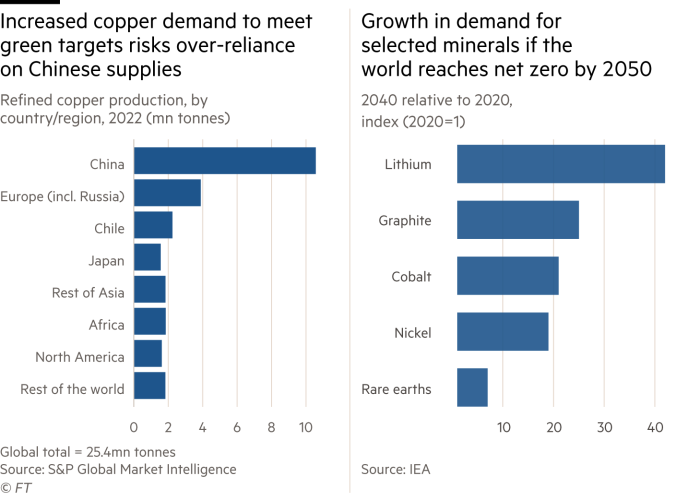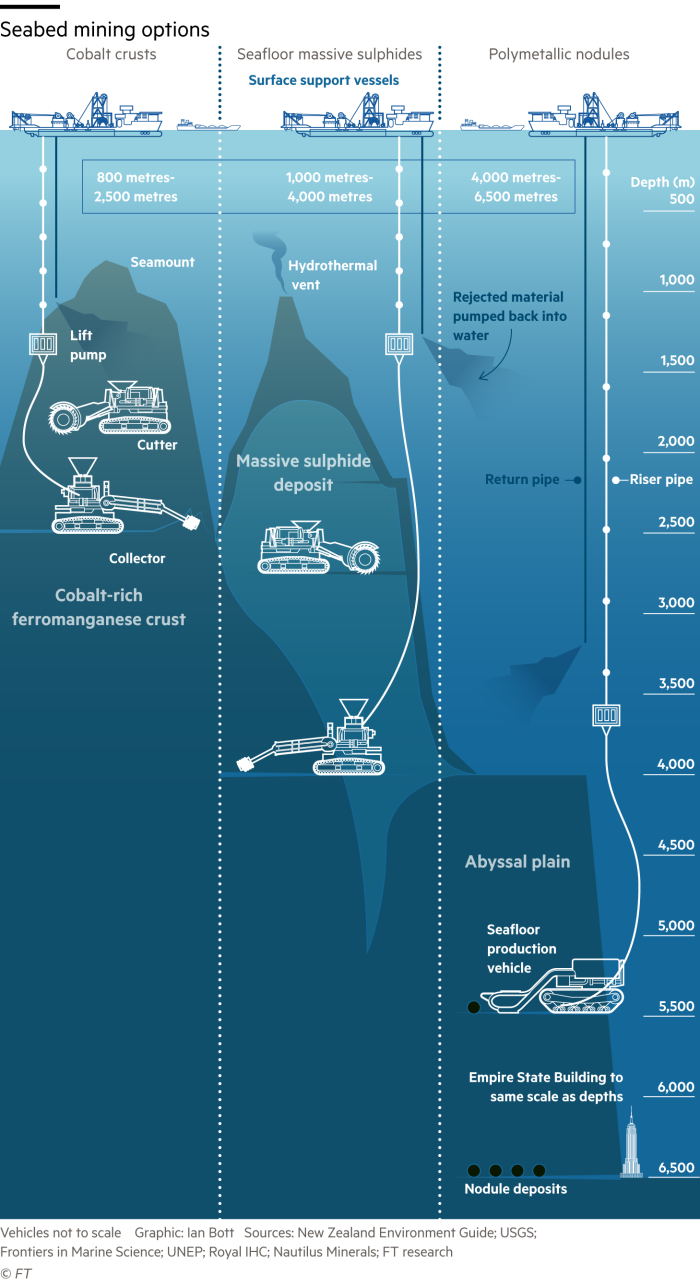[ad_1]
The deepest components of the Pacific Ocean have rested undisturbed for millennia. However now creatures dwelling 1000’s of metres beneath the floor could also be confronted by new guests: firms mining minerals key to the inexperienced power transition.
The Worldwide Seabed Authority (ISA), the UN-backed regulator, is making ready to think about the world’s first business deep-sea mining software as quickly as July, regardless of many member states warning it’s too quickly for extraction to leap from land into water.
Two years in the past, Nauru activated the countdown for a possible begin to business deep-sea mining, a follow hotly debated for the reason that Nineteen Sixties. The tiny Pacific island triggered a authorized clause compelling the ISA to think about functions for business mining permits below the skeleton framework designed for exploration, if it can’t agree on a full set of safeguards for the business earlier than this summer season.
Dealing with that deadline, firms and nations have been racing to affect what comes subsequent. Whereas Nauru is explicitly pushing for functions to be thought-about from July, nations comparable to Norway have adopted a softer pro-mining place, opposing proposals to make it simpler to veto functions. A number of European nations are urging warning whereas additionally finishing up their very own exploratory work, whereas China too is sending vessels to discover the ocean flooring for minerals comparable to cobalt, nickel, manganese and cobalt.
Environmentalists have warned of the dangers as nations search to steadiness shifting away from fossil fuels in opposition to the necessity to defend marine ecosystems, declaring that ecological requirements and legal responsibility mechanisms will nonetheless be in limbo when the deadline passes. Ecological treasures on the seabed embody creatures such because the clear ghost fish, dumbo octopus and big sea anemone, in addition to microscopic worms that scientists say may maintain the important thing to understanding human evolution.
“We want these commodities,” stated Michael Widmer, metals strategist at Financial institution of America. However he added: “Are you able to justify ripping up the ocean flooring to facilitate the power transition?”

Firms can at present discover worldwide waters for minerals, however not exploit them. The transfer by Nauru, which is sponsoring Vancouver-based miner The Metals Firm (TMC), may hasten the arrival of commercial-scale extraction.
Deep-sea mining advocates say the transition is required as a result of terrestrial mining can’t meet the demand for metals important to batteries, wiring and different {hardware} key to the shift away from fossil fuels. The growth in electrical automobiles and grid batteries ensuing from the push to satisfy the Paris Local weather Settlement means mineral demand is about to extend fourfold by 2040, says the Worldwide Vitality Company. Rising terrestrial mining to that extent would imply relying on China and would entail an enormous environmental value.
Offshore teams are testing 3 ways of acquiring minerals, with essentially the most promising possibility involving vacuuming up particular person polymetallic nodules from the ocean flooring which are then transported by way of 4 kilometre-long versatile hoses to offshore vessels. These nodules comprise copper, cobalt, nickel and manganese — metals which are already controversial as a result of their extraction on land is linked with deforestation, pressured labour and the displacement of communities.

On the centre of the wrangle over the way forward for deep-sea mining stands the ISA, a physique created in 1982 to make sure that mineral extraction from worldwide waters would profit humankind. Its selections are taken by a small rotating council of member states on behalf of 167 nations plus the EU — the US has by no means joined. From July, this council may approve exploitation licences — after reviewing functions for a yr — with the backing of only a third of members.
Some diplomats have accused the ISA of adopting an excessively pro-mining place. At a convention final yr, Michael Lodge, its British secretary-general, blamed opposition to deep-sea mining on “rising environmental extremism and dogmatism bordering on fanaticism in some situations”.
He beforehand stated a moratorium could be “anti-science, anti-knowledge, anti-development and anti-international regulation”, and appeared in a promotional video for miner TMC. The Metals Firm stated Lodge had toured its exploration vessel in 2018 and “agreed to share his ideas on the event of this business by way of video”.
A member of the ISA’s governing council stated Lodge triggered unease amongst diplomats in February when he shared a press release seen as searching for to claim the regulator’s supremacy over a landmark UN treaty to guard biodiversity at sea. The brand new settlement will create a physique that would intervene within the case of a man-made catastrophe at sea. The treaty should not “duplicate or undermine” the ISA, Lodge wrote in a February assertion seen by the FT.
A member of Germany’s ISA delegation wrote to Lodge in March with issues that he was resisting efforts by some delegates to decelerate the approval course of for business mining offers. Lodge rejected these issues as “daring and unsubstantiated” in a letter seen by the FT and first obtained by the New York Occasions.
The ISA stated it might take a “precautionary strategy” to seabed mining functions and “welcomes” the brand new UN treaty. The characterisation of Lodge’s feedback on deep-sea mining was “deceptive” and he didn’t consent to showing in TMC’s video, the regulator added. The regulator “welcomes” the conclusion of a brand new UN treaty, whose aims are “on the core of the ISA’s mandate,” it stated.

Some European nations look like taking part in for time. France, Germany and Spain all sponsor deep-sea exploration licences. However at conferences in Jamaica final month, they argued for a precautionary pause on seabed mining. No less than a dozen nations have known as for a short lived halt following recommendation by scientists that the seabed’s function in storing carbon and supporting wildlife was nonetheless too poorly understood.
The UK authorities, which is funding a £6mn scientific analysis mission in its personal Pacific exploration zones, stated in March that it might not assist business mining in these areas till the ISA can agree on world guidelines.
China sponsors extra exploration licences than another state. However its dominance of important mineral provide chains could possibly be threatened if deep-sea mining proceeds earlier than Beijing is prepared, analysts say. At ISA conferences final month, Chinese language diplomats didn’t again a direct go-ahead, however argued environmental issues shouldn’t outweigh the financial advantages of mining, stated two individuals who had been current.
Backed by FTSE 100 miner Glencore and Swiss subsea contractor Allseas in addition to Nauru, TMC is pushing forward. Chief govt Gerard Barron confirmed it plans to submit an software for business mining this yr.
“We’ve got a authorized proper to take action,” stated Barron. “The ISA is finalising the exploitation rules, not sitting round deciding whether or not this could occur or not.”
TMC collected 4,500 tonnes of polymetallic nodules in a trial final yr and plans to gather 1.3mn a yr as soon as it has a business licence. The lossmaking group has promised income from business mining by the top of subsequent yr.
This contrasts with different deep-sea mining firms, which stated they wanted regulatory certainty now to start out business operations close to the top of the last decade.
“No one needs to go seabed mining, not less than for a number of years, apart from The Metals Firm,” stated Duncan Currie, a lawyer on the Deep Sea Conservation Coalition. “It’s created monumental rigidity, diplomatic anxiousness, frustration and exercise, all for one firm.”


The Clarion-Clipperton Zone within the Pacific Ocean, the place most exploration has taken place, is “probably the most biodiverse sedimented marine habitats on our planet”, based on a paper co-authored by Adrian Glover, a Pure Historical past Museum scientist who returned from a UK government-funded deep-sea exploration mission final month.
Environmentalists say the plume of waste water emitted by deep-sea mining equipment may disturb “marine snow”, or carbon and nutrient-rich particles of organic matter, that often settles on the seabed. Noise air pollution might also disturb marine mammals.
Deep-sea ecosystems “take millennia to determine and might take seconds to destroy”, stated Tony Worby, a marine scientist at Australian non-profit Minderoo Basis. “We’re taking part in with fireplace to assume we will go all the way down to the deep sea and strip-mine it with out large repercussions.”
“It’s a trade-off,” stated Kris Van Nijen, managing director of World Sea Mineral Sources, a Belgian deep-sea mining firm. “If we mine Indonesia, Papua New Guinea and Philippines and destroy their rainforests, then to what diploma can polymetallic nodules be a greater useful resource than land-based mining?”


Deep-sea mining faces different unresolved questions. For instance, if a miner launched waste water too near the floor or severely broken the seabed, it stays unclear who could be responsible for compensation.
“You possibly can find yourself with a state of affairs the place Nori [a TMC subsidiary] or any mining firm may go bankrupt or bancrupt with no entry to funds [to pay fines],” stated Pradeep Singh, a maritime regulation skilled at Germany’s Analysis Institute for Sustainability.
Offshore mining would additionally want to indicate it may compete on prices with land-based provides — and persuade carmakers and prospects to embrace it.
Revenue-sharing amongst member states is one other query. It will likely be labored out based mostly on inhabitants dimension, investments in deep-sea mining and income misplaced from terrestrial mining, based on the ISA.
Any choice to proceed with deep-sea mining wouldn’t be a “scientific” one, stated Glover. “It simply relies upon how a lot danger you’re keen to tackle — it’s a political choice.”
Local weather Capital

The place local weather change meets enterprise, markets and politics. Discover the FT’s protection right here.
Are you interested by the FT’s environmental sustainability commitments? Discover out extra about our science-based targets right here
[ad_2]
Source link

